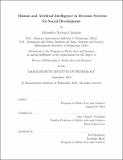| dc.contributor.advisor | Alex "Sandy" Pentland. | en_US |
| dc.contributor.author | Noriega Campero, Alejandro. | en_US |
| dc.contributor.other | Program in Media Arts and Sciences (Massachusetts Institute of Technology) | en_US |
| dc.date.accessioned | 2020-03-23T20:45:33Z | |
| dc.date.available | 2020-03-23T20:45:33Z | |
| dc.date.copyright | 2019 | en_US |
| dc.date.issued | 2019 | en_US |
| dc.identifier.uri | https://hdl.handle.net/1721.1/124209 | |
| dc.description | This electronic version was submitted by the student author. The certified thesis is available in the Institute Archives and Special Collections. | en_US |
| dc.description | Thesis: Ph. D., Massachusetts Institute of Technology, School of Architecture and Planning, Program in Media Arts and Sciences, 2019 | en_US |
| dc.description | Cataloged from student-submitted PDF version of thesis. | en_US |
| dc.description | Includes bibliographical references (pages 131-142). | en_US |
| dc.description.abstract | Today there is widespread expectation about how ubiquitous data and intelligent systems may revolutionize society towards shared prosperity; or conversely, deepen social inequalities, bring the end of human agency, and forgo the right to privacy. In this two-part thesis, we investigate the societal value and perils of hybrid decision systems -- which integrate elements of human and artificial intelligence. Part I of this thesis focuses on their potential for promoting social development goals, with applications in poverty alleviation and public health. Towards public health, in the context of early detection of diabetic blindness, we show that human- AI hybrid systems can be more accurate than either human or algorithm in isolation, and that both opinions benefit from mutual exposure. Towards improved poverty action, we argue that poverty-targeting rules are among the most relevant algorithms operating in the world today. We demonstrate that a shift towards the use of AI methods in poverty-based targeting can substantially increase accuracy, extending the coverage of social policies by nearly a million people in the case of two Latin American countries, without increasing budgets. However, it is also shown that both the status quo and AI-systems induce disparities across population subgroups. Hence, we close by proposing a decision support tool that empowers diverse social institutions to design fair targeting rules under a distributed governance framework. Part II addresses cross-cutting challenges that arise as one applies these technologies in real-world domains towards social development. In particular, the work presented provides academic and practical contributions on: 1) achieving fairness in algorithmic decision systems by means of adaptive information collection, a novel paradigm we call active fairness; and 2) preserving privacy and mapping its tradeoff against utility in development contexts. | en_US |
| dc.description.statementofresponsibility | by Alejandro Noriega Campero. | en_US |
| dc.format.extent | 142 pages | en_US |
| dc.language.iso | eng | en_US |
| dc.publisher | Massachusetts Institute of Technology | en_US |
| dc.rights | MIT theses are protected by copyright. They may be viewed, downloaded, or printed from this source but further reproduction or distribution in any format is prohibited without written permission. | en_US |
| dc.rights.uri | http://dspace.mit.edu/handle/1721.1/7582 | en_US |
| dc.subject | Program in Media Arts and Sciences | en_US |
| dc.title | Human and artificial intelligence in decision systems for social development | en_US |
| dc.type | Thesis | en_US |
| dc.description.degree | Ph. D. | en_US |
| dc.contributor.department | Program in Media Arts and Sciences (Massachusetts Institute of Technology) | en_US |
| dc.identifier.oclc | 1145278709 | en_US |
| dc.description.collection | Ph.D. Massachusetts Institute of Technology, School of Architecture and Planning, Program in Media Arts and Sciences | en_US |
| dspace.imported | 2020-03-23T20:45:32Z | en_US |
| mit.thesis.degree | Doctoral | en_US |
| mit.thesis.department | Media | en_US |
